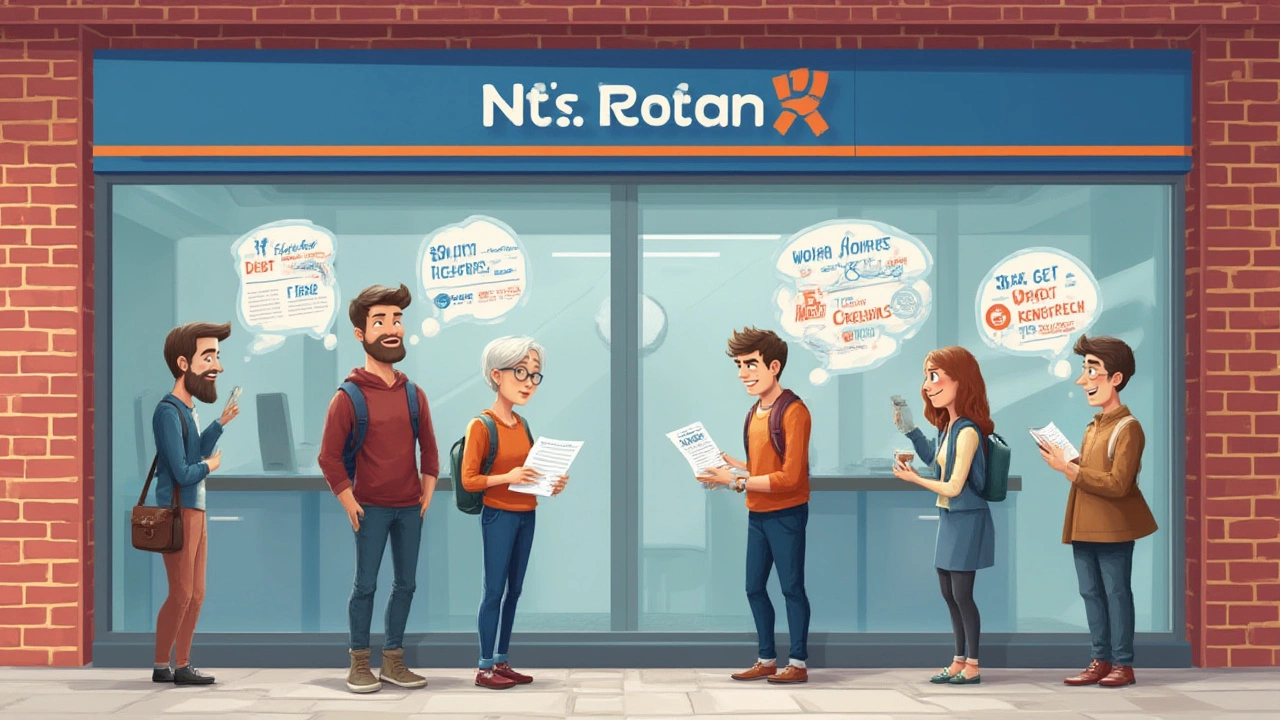Debt Consolidation Qualification: How to Know If You’re Eligible in 2025
 Jul, 11 2025
Jul, 11 2025
Every year, millions of people stare down at a tangle of credit card bills, medical balances, and high-interest loans, wondering how on earth to escape. Debt consolidation sounds like the magic fix. But not everyone who feels stuck in debt actually qualifies. It isn’t just about feeling overwhelmed; lenders look for specific things before they let you roll several debts into one.
Surprisingly, one of the biggest reasons people get denied isn’t a huge mountain of debt—it’s not meeting the basic requirements. Lenders aren’t handing out consolidation loans like candy; they’re running your numbers, checking your history, sometimes even inspecting your monthly habits. If you’ve ever asked, “What qualifies me for debt consolidation?”—you’re in the right place. This isn’t just about cutting your monthly payments, but building a way out.
Understanding Debt Consolidation: What Lenders Really Want
The first thing to get comfortable with: debt consolidation comes in a few flavors. The classic version, a debt consolidation loan, groups all your unsecured debts (think credit cards or medical bills, not mortgages or auto loans) into one new personal loan. There are minor variations: a credit card balance transfer, a home equity loan or line of credit, even special “debt management plans” from nonprofit agencies. But no matter the method, there’s one thing in common—you’re asking someone (a lender, bank, or agency) to bet on your ability to pay them back, on time, every time.
So, what’s on their checklist? They’re not looking for perfection, but here’s what stands out in 2025:
- Strong credit score. For a standard consolidation loan, lenders usually want a credit score above 580—though the best interest rates kick in north of 670. Some banks set the bar even higher. If your score is below 580, your options are limited, and you might be better off with a debt management plan instead of a loan.
- Reliable income and proof of employment. Lenders need to know you’ve got the cash coming in to cover both your current living expenses and the new, consolidated payment. Steady paychecks or long-term social security counts. Gig work can be harder, but not impossible.
- Debt-to-income ratio (DTI). This is a big one. Lenders tally all your monthly debt payments (credit cards, loans, etc.) and compare it to your before-tax income. Most want to see a DTI under 45%. Some stretch up to 50%, but if you’re above that, approval gets trickier.
- Credit history. They’ll dig through the details—recent delinquencies, bankruptcies, collections, or judgments. Too many bumps in the past couple years and you may get a hard pass.
- The type of debt. Most consolidation products only cover unsecured debts. Tax liens, student loans, or secured loans usually won’t qualify.
Out of all these, that debt consolidation keyword—your credit score—matters most for snagging a good rate. An Experian report from March 2024 found that only about 29% of people with subprime credit (below 580) got approved for personal debt consolidation loans, compared to 78% for those with good credit (670 and up).
Want a quick snapshot of requirements side-by-side? Here’s a table that helps spell it out:
| Requirement | Typical Standard |
|---|---|
| Minimum Credit Score | 580 for most lenders; 670+ for best rates |
| Debt-to-Income Ratio | Below 45% ideal, some allow up to 50% |
| Proof of Income | Pay stubs, 2+ years steady employment preferred |
| Type of Debts Allowed | Unsecured debts (credit cards, medical bills) |
| Bankruptcy Record | Typically wait 2+ years after discharge |
Don’t forget, each lender tweaks the rules, but nearly all ask for this combo. It pays to check before you apply—too many failed applications can hurt your credit even more.
Major Roadblocks: Why Some Get Denied
So you think you’re a shoo-in: you make a decent living, keep up with payments (mostly), and you really need that fresh start. Yet, plenty of people get denied. Why? One big issue: applying before you’re really eligible. Lenders love predictability, not surprises. If you’re just coming out of a bankruptcy or foreclosure (especially in the last year or two), you’ll probably need to wait a while even if your score has bounced back.
Another hurdle: your debt-to-income (DTI) ratio. A DTI above 50% sets off alarm bells. Say you bring in $4,000 monthly, but $2,200 already goes toward minimum debt payments—lenders worry you’ll sink with any new loan. Boosting your income or paying down smaller debts can tip the odds in your favor.
Credit history can be a deal-breaker too, especially if you’ve racked up late payments or defaulted more than once in the past year. According to a 2024 LendingTree report, lenders declined about 38% of consolidation applications due to recent delinquencies or charge-offs.
Some other reasons you might hit a wall:
- Your credit utilization (balances vs. limits) is maxed out, signaling risk.
- You lack “credit depth” (maybe you have only a single credit card on file).
- Your debts are mostly secured (like auto loans) or student loans, which consolidation loans rarely touch.
- Recent or ongoing lawsuits, wage garnishments, or severe collections—these make lenders hesitant.
One common mistake: applying at multiple random online lenders “just to see what I can get.” Each hard inquiry can chip away at your score, sometimes enough to take you from “maybe” to “no.” Instead, use online pre-qualification offers. They’ll soft-check your info without penalty, then show real rates if you move forward.
What’s the workaround if you keep hearing “no”? Look at nonprofit credit counseling agencies for debt management plans (DMPs). They work with your current creditors to bundle your bills into a single payment, often at lower interest, and accept nearly all credit scores. This can buy you stability—and maybe, after a year or two of on-time payments, get you “consolidation loan eligible.”

How to Improve Your Chances of Qualifying
Ready for a real shot at qualifying? You don’t need to wait for a miracle. Focus on knocking down the hurdles, step by step. The first thing that pays off is tightening your credit score. Request your free report (you’re entitled to one from each bureau every year on AnnualCreditReport.com), and hunt for errors—about one in five consumers reportedly find mistakes, and fixing them can jump your score by dozens of points fast.
Next up: pay your bills on time, even if you can manage just the minimum. Late payments sting—the newer they are, the harder the hit. Automate those payments if you’re forgetful. Chipping away at your balances, especially on maxed cards, can lower your credit utilization ratio. Experts say getting below 30% utilization is key to a score boost.
Increase your income if possible—pick up side work, ask for extra shifts, or rent out a room. Any bump helps your DTI, because lenders measure only what’s on paper. And while it sounds backwards, avoid closing old accounts unless they cost you money. Lengthy, positive credit history makes you look safer to lenders.
Don’t overlook the value of relationships. If you have a good rapport with your credit union or local bank, schedule an appointment. Sometimes they can bend rules or offer “relationship discounts” you won’t see advertised online.
And here's a surprising tip: sometimes, your *total* amount of debt isn’t the main issue—it’s how it’s organized. Lenders may approve you if your minimum monthly payments eat up less than half your take-home pay, even if the balances are large. Focus on reducing minimum monthly obligations, not just overall balance.
Finally, gather your paperwork before you apply. Lenders will want pay stubs, tax returns, bank statements, ID, and maybe proof of residency. Having these ready signals you’re organized and serious.
- Request your credit reports and dispute errors right away.
- Set up automatic minimum payments for all your bills.
- Pay down maxed-out credit cards below 30% of the limit.
- Build up your income if possible before applying.
- Organize required paperwork ahead of time to avoid delays.
If you hit a dead end with personal loans, don’t rule out balance transfer cards (they usually require higher scores but can be cheaper for smaller debts), or a home equity loan (if you own your home and rates make sense).
Smart Moves After Qualifying: Getting the Best Out of Debt Consolidation
So you’ve checked all the boxes and you’re approved—now what? It’s easy to think consolidating is the finish line, but reality says otherwise. Your journey is just getting started. The first thing to watch out for: loan terms. Don’t just look at monthly payments—check total payback amount, interest rate, and any fees. According to a 2025 NerdWallet survey, about 56% of people ended up with debt consolidation loans that cost more over the life of the loan than continuing minimum payments would have, just because of longer terms.
Be careful with old credit cards. Shutting them all can dip your credit score, thanks to the lost available credit and age of accounts. Instead, lock them away, leave them open, and use them sparingly (think: a monthly coffee run you pay off right away) to keep them active.
Track your habits. The biggest risk after consolidating is running your cards back up. One 2023 study out of the University of Michigan found that nearly 40% of debt consolidators ended up back in significant debt within two years, mostly from slipping back into old spending patterns. Set a bare-bones budget, automate your loan payment, and consider weekly “money check-ins.”
If possible, make extra payments. Even one extra payment a year can shave off months of interest. Many consolidation loans have no prepayment penalties, but check your terms to be sure. And don’t forget to alert your old creditors—some banks close accounts, others may need a nudge that your account is now paid.
If your consolidation is through a nonprofit DMP, stick to the payment plan like glue. Missed payments can get you dropped from the program, which reactivates all those old fees and rates.
Want a quick-hit checklist for your post-approval moves?
- Read the fine print for interest rates, terms, and fees.
- Keep old credit cards open, but don’t use them for new spending.
- Lock in a rock-solid budget to avoid new debt.
- Automate your new consolidated payment.
- Check regularly on your credit report and score.
- Contact your old creditors to confirm zero balances after payouts.
Debt consolidation can absolutely be a step toward financial freedom. It’s not about magic, but about meeting the right requirements and being disciplined after you get the green light. Your best bet? Stay honest about your financial picture, take action on improving weak spots, and walk into the process eyes wide open. If you play it right, you can turn a mountain of payments into one manageable plan—and that’s a win worth working for.
